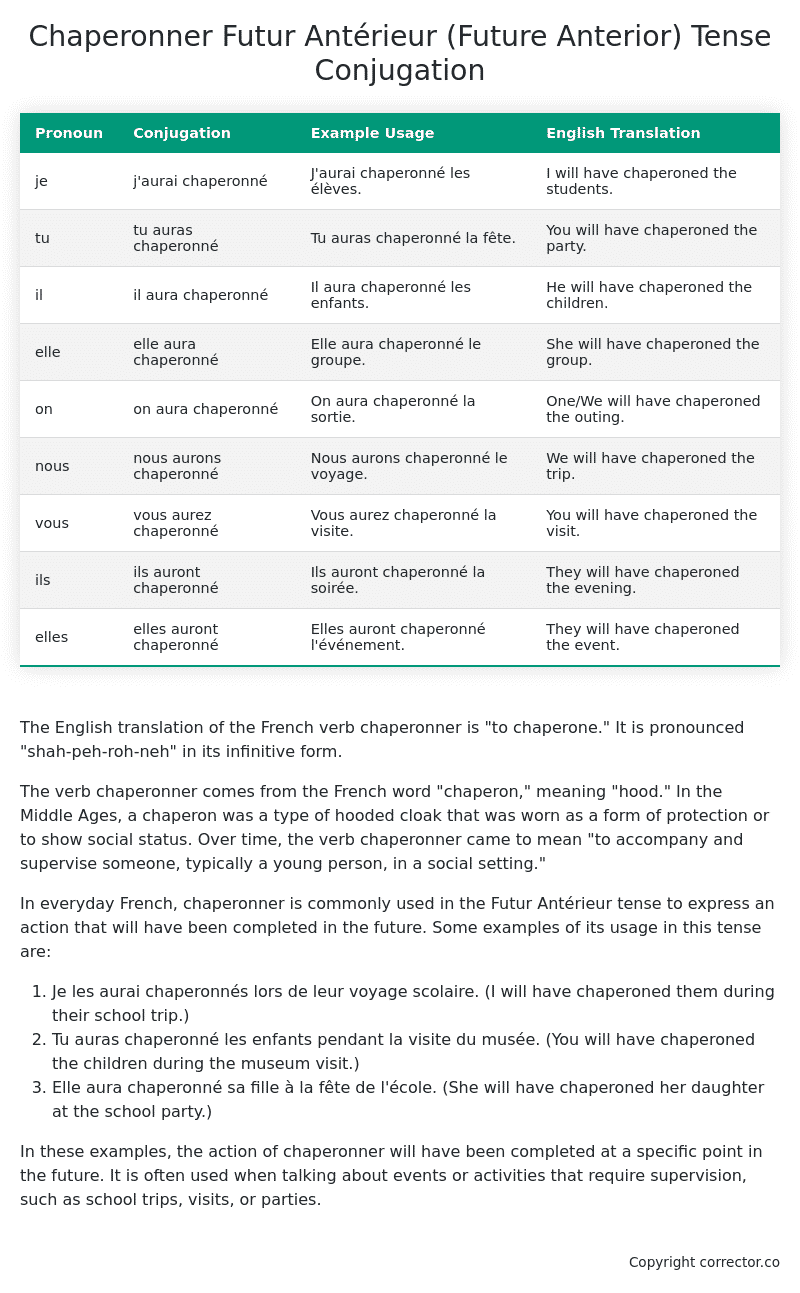Futur Antérieur (Future Anterior) Tense Conjugation of the French Verb chaperonner
Introduction to the verb chaperonner
The English translation of the French verb chaperonner is “to chaperone.” It is pronounced “shah-peh-roh-neh” in its infinitive form.
The verb chaperonner comes from the French word “chaperon,” meaning “hood.” In the Middle Ages, a chaperon was a type of hooded cloak that was worn as a form of protection or to show social status. Over time, the verb chaperonner came to mean “to accompany and supervise someone, typically a young person, in a social setting.”
In everyday French, chaperonner is commonly used in the Futur Antérieur tense to express an action that will have been completed in the future. Some examples of its usage in this tense are:
- Je les aurai chaperonnés lors de leur voyage scolaire. (I will have chaperoned them during their school trip.)
- Tu auras chaperonné les enfants pendant la visite du musée. (You will have chaperoned the children during the museum visit.)
- Elle aura chaperonné sa fille à la fête de l’école. (She will have chaperoned her daughter at the school party.)
In these examples, the action of chaperonner will have been completed at a specific point in the future. It is often used when talking about events or activities that require supervision, such as school trips, visits, or parties.
Table of the Futur Antérieur (Future Anterior) Tense Conjugation of chaperonner
| Pronoun | Conjugation | Example Usage | English Translation |
|---|---|---|---|
| je | j’aurai chaperonné | J’aurai chaperonné les élèves. | I will have chaperoned the students. |
| tu | tu auras chaperonné | Tu auras chaperonné la fête. | You will have chaperoned the party. |
| il | il aura chaperonné | Il aura chaperonné les enfants. | He will have chaperoned the children. |
| elle | elle aura chaperonné | Elle aura chaperonné le groupe. | She will have chaperoned the group. |
| on | on aura chaperonné | On aura chaperonné la sortie. | One/We will have chaperoned the outing. |
| nous | nous aurons chaperonné | Nous aurons chaperonné le voyage. | We will have chaperoned the trip. |
| vous | vous aurez chaperonné | Vous aurez chaperonné la visite. | You will have chaperoned the visit. |
| ils | ils auront chaperonné | Ils auront chaperonné la soirée. | They will have chaperoned the evening. |
| elles | elles auront chaperonné | Elles auront chaperonné l’événement. | They will have chaperoned the event. |
Other Conjugations for Chaperonner.
Le Present (Present Tense) Conjugation of the French Verb chaperonner
Imparfait (Imperfect) Tense Conjugation of the French Verb chaperonner
Passé Simple (Simple Past) Tense Conjugation of the French Verb chaperonner
Passé Composé (Present Perfect) Tense Conjugation of the French Verb chaperonner
Futur Simple (Simple Future) Tense Conjugation of the French Verb chaperonner
Futur Proche (Near Future) Tense Conjugation of the French Verb chaperonner
Plus-que-parfait (Pluperfect) Tense Conjugation of the French Verb chaperonner
Passé Antérieur (Past Anterior) Tense Conjugation of the French Verb chaperonner
Futur Antérieur (Future Anterior) Tense Conjugation of the French Verb chaperonner (this article)
Subjonctif Présent (Subjunctive Present) Tense Conjugation of the French Verb chaperonner
Subjonctif Passé (Subjunctive Past) Tense Conjugation of the French Verb chaperonner
Subjonctif Imparfait (Subjunctive Imperfect) Tense Conjugation of the French Verb chaperonner
Conditionnel Présent (Conditional Present) Tense Conjugation of the French Verb chaperonner
Conditionnel Passé (Conditional Past) Tense Conjugation of the French Verb chaperonner
L’impératif Présent (Imperative Present) Tense Conjugation of the French Verb chaperonner
L’infinitif Présent (Infinitive Present) Tense Conjugation of the French Verb chaperonner
Struggling with French verbs or the language in general? Why not use our free French Grammar Checker – no registration required!
Get a FREE Download Study Sheet of this Conjugation 🔥
Simply right click the image below, click “save image” and get your free reference for the chaperonner Futur Antérieur tense conjugation!

Chaperonner – About the French Futur Antérieur (Future Anterior) Tense
Construction
Common Everyday Usage Patterns
Interactions with Other Tenses
For example
Summary
I hope you enjoyed this article on the verb chaperonner. Still in a learning mood? Check out another TOTALLY random French verb conjugation!


